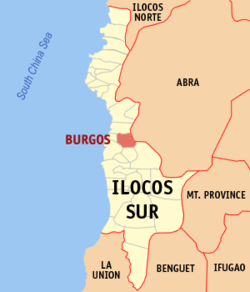Burgos, Ilocos Sur
| Burgos | ||
|---|---|---|
| Municipality | ||
| ||
 Map of Ilocos Sur showing the location of Burgos | ||
.svg.png) Burgos Location within the Philippines | ||
| Coordinates: 17°20′N 120°30′E / 17.333°N 120.500°ECoordinates: 17°20′N 120°30′E / 17.333°N 120.500°E | ||
| Country | Philippines | |
| Region | Ilocos (Region I) | |
| Province | Ilocos Sur | |
| District | 2nd District | |
| Barangays | 26 | |
| Government[1] | ||
| • Mayor | Riolita Rivera Balbalan | |
| Area[2] | ||
| • Total | 44.38 km2 (17.14 sq mi) | |
| Population (2010)[3] | ||
| • Total | 11,679 | |
| • Density | 260/km2 (680/sq mi) | |
| Time zone | PST (UTC+8) | |
| ZIP code | 2724 | |
| Dialing code | 77 | |
| Income class | 4th class | |
Burgos is a fourth-class municipality in the province of Ilocos Sur, Philippines. According to the 2010 census, it has a population of 11,679 people.[3]
Barangays
Burgos is politically subdivided into 26 barangays, or neighborhoods.[2]
- Ambugat
- Balugang
- Bangbangar
- Bessang
- Cabcaburao
- Cadacad
- Callitong
- Dayanki
- Lesseb
- Lubing
- Lucaban
- Luna
- Macaoayan
- Mambug
- Manaboc
- Mapanit
- Poblacion Sur (Masingit)
- Nagpanaoan
- Dirdirig (Dirdirig-Padayao)
- Paduros
- Patac
- Poblacion Norte (Bato)
- Sabangan Pinggan
- Subadi Norte
- Subadi Sur
- Taliao
History
Burgos came into existence in 1831 when Father Bernardino Logo was able to convert many natives into the folds of Christianity. The resulting town became Nueva Coveta. It was envied by its neighbors because of its peace and order, as well as its progress, since it sold its resulting products in places as far as Pangasinan and Tarlac.
Burgos became a township of Santa Maria in the latter period of Ilocos Sur's Spanish Era. It was later named in honor of Father José Burgos.
Demographics
| Population census of Burgos | ||
|---|---|---|
| Year | Pop. | ±% p.a. |
| 1990 | 9,601 | — |
| 1995 | 10,101 | +0.96% |
| 2000 | 11,175 | +2.19% |
| 2007 | 11,459 | +0.35% |
| 2010 | 11,679 | +0.69% |
| Source: National Statistics Office[3][4] | ||
References
- ↑ "Official City/Municipal 2013 Election Results". Intramuros, Manila, Philippines: Commission on Elections (COMELEC). 1 July 2013. Retrieved 23 September 2013.
- 1 2 "Province: ILOCOS SUR". PSGC Interactive. Makati City, Philippines: National Statistical Coordination Board. Archived from the original on 1 January 1970. Retrieved 23 September 2013.
- 1 2 3 "Total Population by Province, City, Municipality and Barangay: as of May 1, 2010" (PDF). 2010 Census of Population and Housing. National Statistics Office. Archived from the original (PDF) on 15 November 2012. Retrieved 23 September 2013.
- ↑ "Province of Ilocos Sur". Municipality Population Data. LWUA Research Division. Retrieved 23 September 2013.
External links
- Pasyalang Ilocos Sur
- Philippine Standard Geographic Code
- Philippine Census Information
- Local Governance Performance Management System
 |
Santa Maria | Pilar, Abra |  | |
| San Esteban | |
|||
| ||||
| | ||||
| Santiago | Lidlidda | San Emilio |
This article is issued from Wikipedia - version of the 11/10/2016. The text is available under the Creative Commons Attribution/Share Alike but additional terms may apply for the media files.
